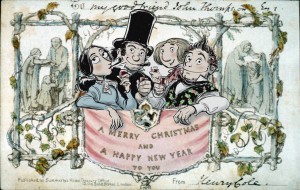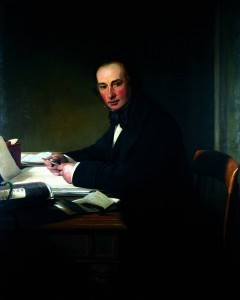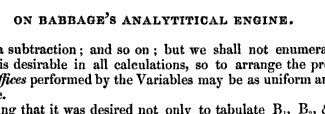Sydney Padua's Blog, page 5
January 2, 2013
User Experience Pages the 10th and 11th
Aaaaaaand we’re back. Sorry if the text is a little small.. I’m adjusting everything for print which is uncomfortable at this size, I’ll need to tweak the website design I think!
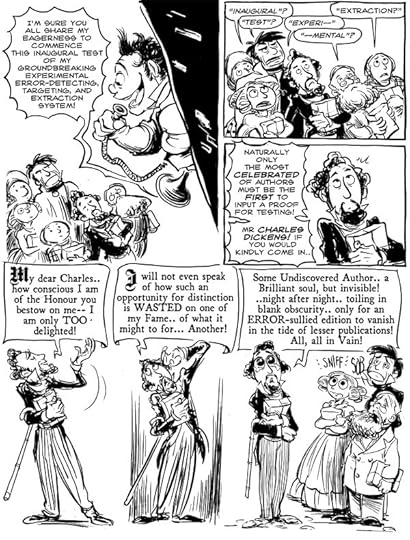
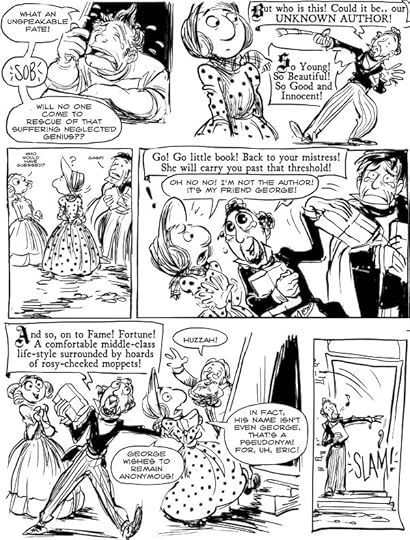
NOTES NOTES BEAUTIFUL NOTES!
It’s hard to come away from a biography of Dickens with feelings of unmingled affection (I especially have a short temper at the moment with authors possessed of bottomless torrents of productivity) so I’ve made him a bit of a stinker. I am altogether unjust in depicting him outing George Eliot– indeed, he wrote her a charming and highly Dickensian letter on reading the anonymous Scenes of Clerical Life:
You will not suppose that I have any vulgar wish to fathom your secret… If it should ever suit your convenience and inclination to show me the face of the man, or woman, who has written so charmingly, it will be a very memorable occasion to me.
Dickens would certainly have known what line to take to work on Babbage’s feelings- it’s pretty accepted that the inventor of the McGuffin-y mechanism in Little Dorrit, Mr Doyce, was based if not on Babbage, at least on Babbage’s situation–
‘This Doyce,’ said Mr Meagles, ‘is a smith and engineer. He is not in a large way, but he is well known as a very ingenious man. A dozen years ago, he perfects an invention (involving a very curious secret process) of great importance to his country and his fellow-creatures. I won’t say how much money it cost him, or how many years of his life he had been about it, but he brought it to perfection a dozen years ago. Wasn’t it a dozen?’ said Mr Meagles, addressing Doyce. ‘He is the most exasperating man in the world; he never complains!’
Aside– the modest, patient, uncomplaining, almost personality-less Doyce doesn’t much resemble Babbage, who complained A LOT and at length.. I wonder if Dickens wasn’t having a bit of fun with the Uncomplaining Doyce.
With this prelude, Mr Meagles went through the narrative; the established narrative, which has become tiresome; the matter-of-course narrative which we all know by heart. How, after interminable attendance and correspondence, after infinite impertinences, ignorances, and insults, my lords made a Minute, number three thousand four hundred and seventy-two, allowing the culprit to make certain trials of his invention at his own expense.
How the trials were made in the presence of a board of six, of whom two ancient members were too blind to see it, two other ancient members were too deaf to hear it, one other ancient member was too lame to get near it, and the final ancient member was too pig-headed to look at it. How there were more years; more impertinences, ignorances, and insults. How my lords then made a Minute, number five thousand one hundred and three, whereby they resigned the business to the Circumlocution Office. How the Circumlocution Office, in course of time, took up the business as if it were a bran new thing of yesterday, which had never been heard of before; muddled the business, addled the business, tossed the business in a wet blanket. How the impertinences, ignorances, and insults went through the multiplication table. How there was a reference of the invention to three Barnacles and a Stiltstalking, who knew nothing about it; into whose heads nothing could be hammered about it; who got bored about it, and reported physical impossibilities about it. How the Circumlocution Office, in a Minute, number eight thousand seven hundred and forty, ‘saw no reason to reverse the decision at which my lords had arrived.’ How the Circumlocution Office, being reminded that my lords had arrived at no decision, shelved the business. How there had been a final interview with the head of the Circumlocution Office that very morning, and how the Brazen Head had spoken, and had been, upon the whole, and under all the circumstances, and looking at it from the various points of view, of opinion that one of two courses was to be pursued in respect of the business: that was to say, either to leave it alone for evermore, or to begin it all over again.
My word that’s a lot of words! I must say I couldn’t fit HALF of what Dickens wanted to say into his sadly finite speech balloons. And I thought it was tough getting Lovelace’s dialogue in!

December 21, 2012
Happy Holidays!
Shamelessly ripped off of the First Christmas card, 1843:
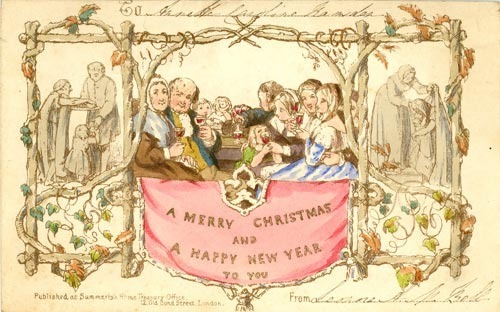
Brunel connection! The guy who drew the card, John Horsley, was Brunel’s brother-in-law and close friend. He painted several portraits of him, this is the most Christmasy one on account of the red cheeks (of which Horsley seems to have been rather over-fond)
Babbage connection: the business brain behind the Christmas Card, Henry Cole, worked with Rowland Hill on the introduction of the Penny Post, of which Babbage claims to have been the inspirer (though historians of the postal variety dispute this).
Lovelace connection: None found. :(
This has been quite the year here at 2dgoggles, over which the shadowy, colossal form of The Book towers like a.. big.. towering.. thing… plagued by myriad frustrations… and capped by the Great Hard Drive Apocalypse of November 2012 (FAIL, Mayans, off by a month!). Fear not OF COURSE I had multiple backups are you CRAZY? In any event we are BACK IN BUSINESS and 2013 shall be the Year of The Comics.
I leave you with a spirited Seasonal Tune! Wait for the carol which even Babbage might approve of! Well, tolerate… happy holidays everyone!

November 30, 2012
*Sigh*
Sorry folks, looks like I need a new hard drive… and just back from Ireland and off to Denmark straight away for a couple of weeks, for my Celebrated Lectures on Bovine Locomotion as Interpreted by the Animation Artist, It’s Attendant Joys and Sorrows. Should have the ol’ machine up and running by then though so this interruption shouldn’t go on too long! Life does interfere with comics so!
While I fiddle tiny screws and drop them under the sofa, please enjoy stunning super-duper hires images of the Magnificent Difference Engine, and some great video:

November 26, 2012
:(
Apologises, my friends whose little faith is amply justified! No page today I’m afraid, I’m over the sea in Ireland experiencing technical difficulties..
In recompense you shall get THREE pages on Friday, as they are already drawn and eager to be posted on my return. Well it wouldn’t be 2dgoggles without disruptions to the continuum I suppose.

November 23, 2012
User Experience Page 9
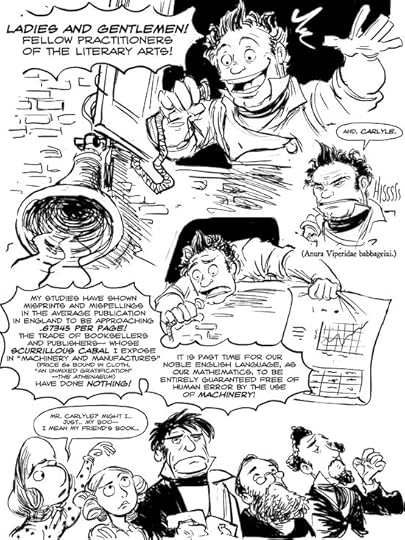
I’ve been so rushed I feel I’ve been shortchanging you folks on your NOTES, which I know full well is 64% of the reason anyone reads the comic in the first place so.. A quick recap of some of our friends:
CHARLES BABBAGE
was, we must not forget, a notable writer as well as a mathematician. By far his greatest hit was “On the Economy of Machinery and Manufactures” which is indeed an unmixed gratification. I link you to the 3rd edition because you may enjoy not only his initial exposure of the cabal of booksellers, but also his rebuttal of their defence, prefacing the 2nd edition, AND the further dramatic developments for those watching at home from the preface to the 3rd edition (with charts!).
THOMAS CARLYLE
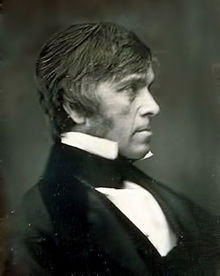 — the preeminent, and least currently read, Victorian Public Intellectual. If living now would have regular column in The Times and do big BBC history series, that sort of thing. — shared an intense mutual dislike with Charles Babbage, I’m not sure why. Possibly because Carlyle disliked economists and mathematicians (he coined the phrase ‘the dismal science’); possibly because they were rivals in dinner-party conversation-dominating — or possibly because they were on opposite sides of the slavery issue- abolitionist Babbage inserts a heartfelt plea against it in the 9th Bridgewater Treatise; Carlyle would I’m sure be surprised to find himself the author of what must be the only Victorian essay with a genuinely unprintable title (NSFW) –such was their antagonism that they were unable to bond over their mutual persecution by street urchins and street musicians and hobby of running outside WITHOUT HATS to confront them.
— the preeminent, and least currently read, Victorian Public Intellectual. If living now would have regular column in The Times and do big BBC history series, that sort of thing. — shared an intense mutual dislike with Charles Babbage, I’m not sure why. Possibly because Carlyle disliked economists and mathematicians (he coined the phrase ‘the dismal science’); possibly because they were rivals in dinner-party conversation-dominating — or possibly because they were on opposite sides of the slavery issue- abolitionist Babbage inserts a heartfelt plea against it in the 9th Bridgewater Treatise; Carlyle would I’m sure be surprised to find himself the author of what must be the only Victorian essay with a genuinely unprintable title (NSFW) –such was their antagonism that they were unable to bond over their mutual persecution by street urchins and street musicians and hobby of running outside WITHOUT HATS to confront them.
WILIKE COLLINS

– his books are really great. You haven’t read OMG go read it! Why isn’t it a lavish BBC spectacular? Honestly. — He hung out with Dickens and they wrote an awful play together, The Frozen Deep — His father was a notable landscape painter and described 19-yr-old Ada Lovelaceas “delightful and simple-minded, without an atom of pride”. She never met Wilkie as far as I know which is a shame as I think they would have gotten on LIKE A HOUSE ON FIRE. — on account of they both liked unconventional women, unconventional marriages, and opium — Marion Halcombe in The Woman In White is thought to be based on George Eliot. Dang it I need to work that better into the comic.
The easy elegance of every movement of her limbs and body as soon as she began to advance from the far end of the room, set me in a flutter of expectation to see her face clearly. She left the window—and I said to myself, The lady is dark. She moved forward a few steps—and I said to myself, The lady is young. She approached nearer—and I said to myself (with a sense of surprise which words fail me to express), The lady is ugly! Never was the old conventional maxim, that Nature cannot err, more flatly contradicted—never was the fair promise of a lovely figure more strangely and startlingly belied by the face and head that crowned it. The lady’s complexion was almost swarthy, and the dark down on her upper lip was almost a moustache. She had a large, firm, masculine mouth and jaw; prominent, piercing, resolute brown eyes; and thick, coal-black hair, growing unusually low down on her forehead.
 GEORGE ELIOT
GEORGE ELIOTHere she is again! I love George. The Lady Novelist’s jibe about her ‘friend’ George in the last page is an allusion to Marion Evans extremely unconventional marriage, or ‘marriage’ to George Henry Lewes. I don’t often recommend secondary sources but if you want a cozy gossip about weird Victorian personal relations Parallel Lives tells you ALL ABOUT not just George Eliot and Robert Carlyle, but also Ruskin, JS Mill, and Charles Dickens.
CHARLES DICKENS we will get to know more next week!
(I have not, before you ask, actually conducted a statistical survey of misprints in Victorian publications BUT I will leave you with the most poetical example of all: the final page of Lovelace’s magisterial, yet extremely full of typos, paper on computer science and the elimination of errors by machinery, which not only misprints her initials as “A.L.L” instead of “A.A.L” (Augusta Ada Lovelace that is), but is headed “The Analytitical Engine”!

November 21, 2012
User Experience Page 8
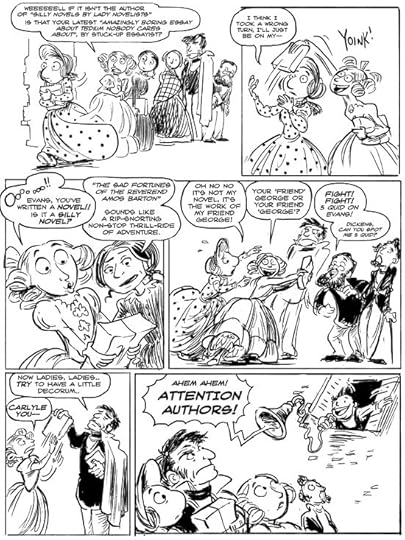
Page 8! The ladies are the anonymous author of “Rank and Beauty”, roundly mocked in Silly Novels By Lady Novelists, and Yours Truly, as though I’m debatably a lady my novel is beyond all doubt extremely silly.

November 19, 2012
User Experience Page 7
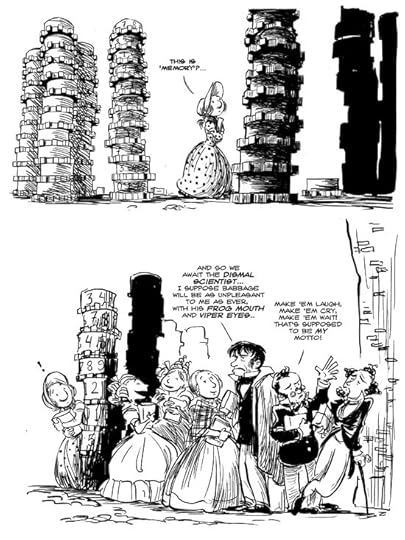
Notes, quick like a bunny!
Thomas Carlyle, the tall grim-looking fellow, shared a cordial mutual loathing with Babbage; he described him as having a “frog mouth and viper eyes” here. Well, fair enough, but that’s what makes him adorable, Carlyle!
Wilkie Collins, Mr. Make ‘Em Laugh, Cry, Wait.

November 16, 2012
User Experience Page 6
User Experience Page 6!
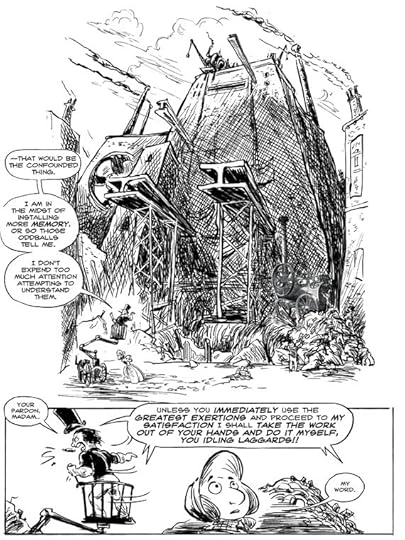
Brunel’s last bit of dialogue from The Intemperate Engineer, natch. I am never at a loss for direct quotations of Brunel yelling at people!
In other news, new tshirts!

November 14, 2012
User Experience Page the Fifth
Greetings Ladies and germs, here is page 5-
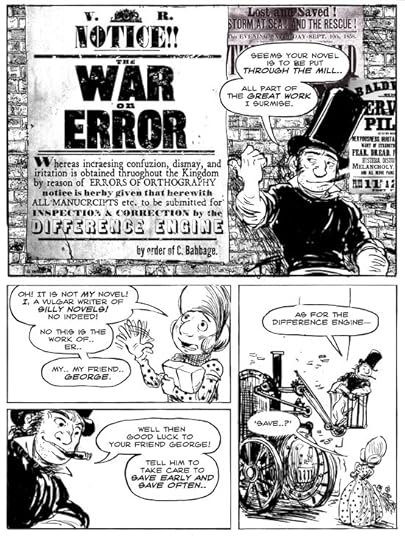
NOTSES!
Brunel is being sarcastic about the Great Work of legislated standardisation.. he was a prime individualist and does an alarming John Galt impression in the hearings on workplace safety recorded in the invaluable The Intemperate Engineer:
A man who is working piece work at the bottom of a mine is thrown entirely upon his own resources and his success depends upon his own care and throwing liability of any accident to him upon the master would necessarily involve a much greater interference on the part of the master with the mode of proceeding and the whole detail of the work of the workman… Some risks I admit are run as a consequence but I do not think that the results of those risks are at all to be compared with the advantage attained in our manufactures generally by that system…
I believe personally that exactly this system out to be applied to spelling and other errors of those of labouring in the mines of creation..
Marian Evans’ heavy resistance to revealing herself as George Eliot is possibly too involved a subject to launch into on such a lovely day when I’m getting hungry. Plenty of time for more notes on that later, pleeeenty of time.. in the meantime, enjoy her
Silly Novels By Lady Novelists.
Don’t forget, if you’re in London and it’s Wednesday the 14th of November and you have nothing better to do, I’m chatting with some folks at GOSH COMICS between 7 and 9– along with, it seems (to my great excitement) Apostolos Dodiaxis, author of Logicomix! Followed by a pint or two at, most appropriately, the John Snow, who is wondering when I’m going to get around to his big moment in Vampire Poets.

November 12, 2012
User Experience Pg 4
Pg 4, oh faithless nation!
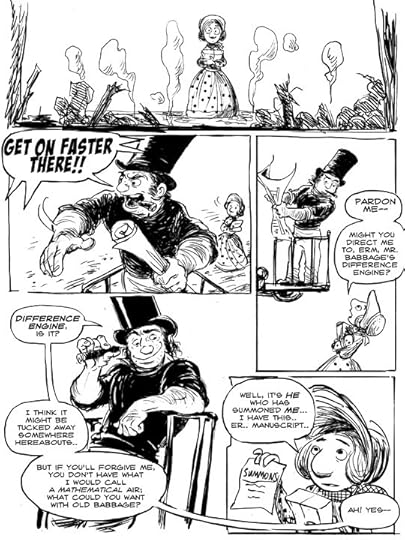
Brunel is not constructing a railway here, but the destruction of neighbourhoods like big projects brought is painted, with usual accumulation of wordage, by Dickens in Dombey and Son:
The first shock of a great earthquake had, just at that period, rent the whole neighbourhood to its centre. Traces of its course were visible on every side. Houses were knocked down; streets broken through and stopped; deep pits and trenches dug in the ground; enormous heaps of earth and clay thrown up; buildings that were undermined and shaking, propped by great beams of wood. Here, a chaos of carts, overthrown and jumbled together, lay topsy- turvy at the bottom of a steep unnatural hill; there, confused treasures of iron soaked and rusted in something that had accidentally become a pond. Everywhere were bridges that led nowhere; thoroughfares that were wholly impassable; Babel towers of chimneys, wanting half their height; temporary wooden houses and enclosures, in the most unlikely situations; carcases of ragged tenements, and fragments of unfinished walls and arches, and piles of scaffolding, and wildernesses of bricks, and giant forms of cranes, and tripods straddling above nothing. There were a hundred thousand shapes and substances of incompleteness, wildly mingled out of their places, upside down, burrowing in the earth, aspiring in the air, mouldering in the water, and unintelligible as any dream. Hot springs and fiery eruptions, the usual attendants upon earthquakes, lent their contributions of confusion to the scene. Boiling water hissed and heaved within dilapidated walls; whence, also, the glare and roar of flames came issuing forth; and mounds of ashes blocked up rights of way, and wholly changed the law and custom of the neighbourhood.
In short, the yet unfinished and unopened Railroad was in progress; and, from the very core of all this dire disorder, trailed smoothly away, upon its mighty course of civilisation and improvement.
Yeah, I’ll draw that stuff in later.. *gazes forlornly at comics progress chart*


